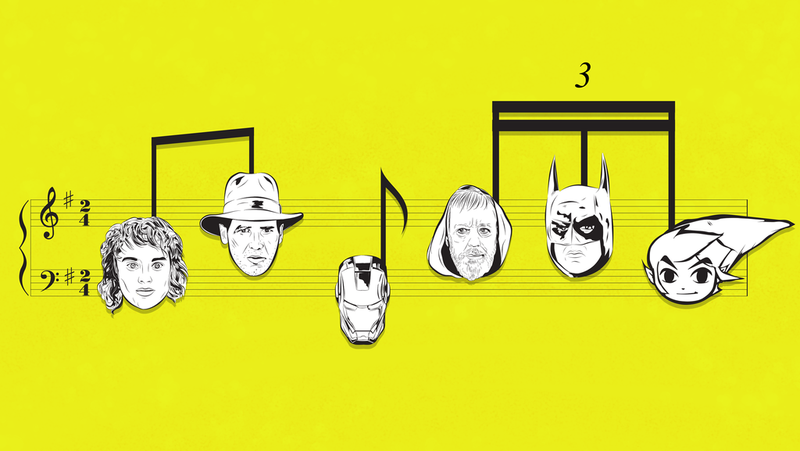
When we hear music from Star Wars or The Legend of Zelda, we think of noble destinies or awaiting adventures. When we hear Batman’s theme, we picture a lone hero, overlooking a city at night. We think of those things because the music—specifically each character’s theme—explicitly expresses and embodies them.
It’s easy to take that kind of subtle musical functionality for granted, or to hear it without realizing you’ve heard it. I wanted to highlight some of my favorite heroic themes, along with the stories they tell. I wrote out each theme, too; these are just my approximate transcriptions, but they convey the general contour of each one.
I’ve put all of the music in the post into a single Youtube playlist, which you can listen to here. (Maybe open it in a separate tab so you can keep it playing.)
I hope you’ll listen as we go, and if you don’t read sheet music, you can at least follow along with the shape of each melody on the page.
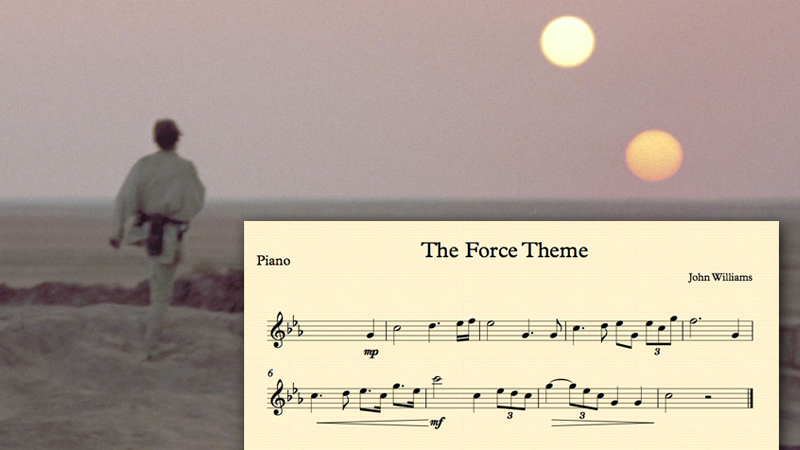
Star Wars: The Force Theme
Story It Tells: A Noble Destiny Awakens
Composer: John Williams
Key: C Minor
Listen: Here
Star Wars has many iconic themes, but I (and I sense many others) would argue that “The Force Theme” is its primary hero’s theme. It’s a good first example because it’s helpful for explaining what I even mean by a “hero’s theme” in the first place. The Star Wars title sequence music is easily the most iconic Star Wars music, but when I hear it, I don’t think of a specific character or a specific narrative. I just think “Hell yeah, time for some Star Wars!”
When I hear “The Force Theme,” I think of the heroes themselves: Of Luke, and Obi Wan, and now Rey. It’s the hero’s theme because it musically mirrors the journey of the heroes themselves. Above all else, The Force Theme conjures a sense of mystery and discovery. It’s basically the theme song of “having a noble destiny.”
It’s not a triumphal theme, and it deliberately ends quietly, without achieving a dramatic resolution. The theme itself rises from a soft sea of shimmering strings, which twinkle at the margins like, well, stars. Think about how you feel at this melody’s conclusion: You haven’t achieved your destiny, you’ve merely detected that it exists. This music is going somewhere, but it doesn’t actually arrive there.
Related to that, I really liked how they riffed on this theme in my favorite trailer for The Force Awakens:
The familiar theme starts out and builds as we expect it to, but instead of ending in the quiet, yet-to-be-resolved place that it usually does, it just keeps building. The harmonies pile on top of themselves; the strings drop and the brass climbs; the orchestra expands until it’s just aching for resolution… a resolution you will only get if you actually go see the movie.
Not only did the music for that trailer promise a resolution to come, it worked as an encapsulation of The Force Awakens itself: A familiar theme in a familiar setting, eventually expanding outside itself with the promise of a new destination. I’m not sure a trailer has ever made me more excited to see a film.
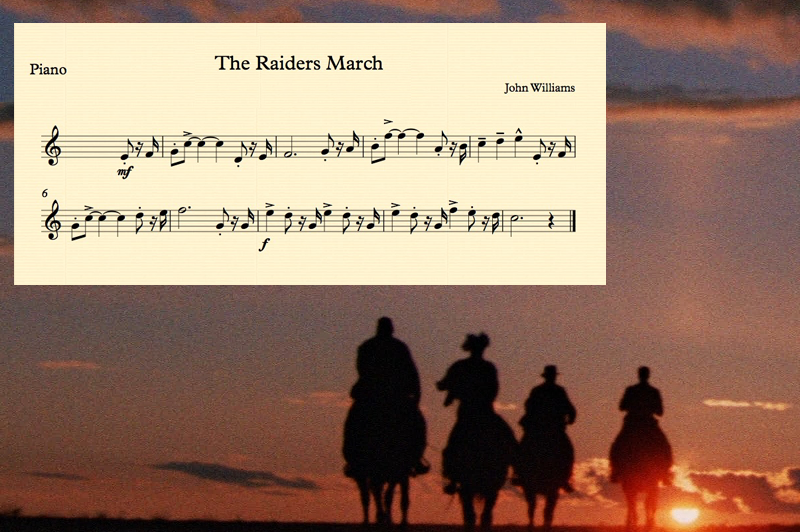
Indiana Jones: The Raiders March
Story It Tells: The Confident Hero Rides Across the Horizon
Composer: John Williams
Key: C Major
Listen: Here
The Raiders March, usually just called “The Indiana Jones Theme,” is a remarkably laid-back heroic theme by John Williams standards. It’s triumphant but confident about it; it doesn’t push or stride or scream to announce itself. The orchestra moves lightly, almost lazily, suggesting a confident lack of urgency.
The melody itself is emotionally static—it feels more like a celebration of the character than a call to arms or action. It conjures the cocksure Indy that we all know and love: riding a horse along the horizon, en route to another adventure.
(As an aside, any time my colleague Jason Schreier makes a clutch play in Destiny PvP, he starts to sing this song into his headset. It’s really a perfect choice on several levels.)
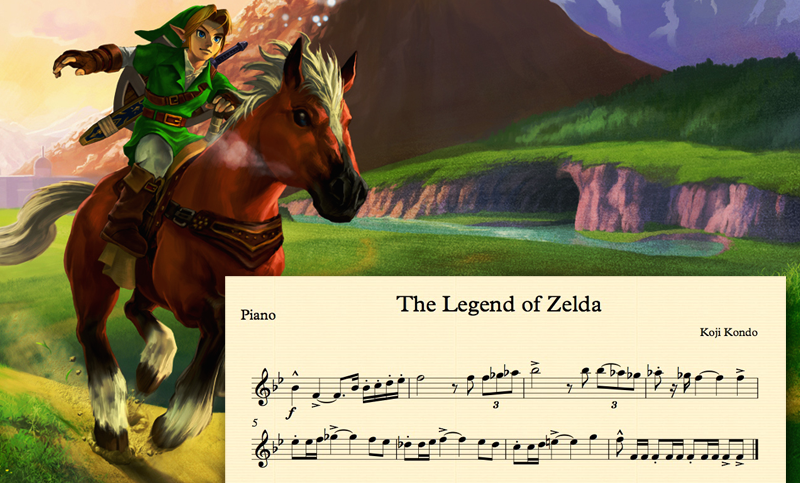
The Legend of Zelda: Main Theme
Story It Tells: And Now, It’s Time To Go On An Adventure
Composer: Koji Kondo
Key: Bb Major
Listen: Here
Forward! That’s the word I most associate with the Koji Kondo’s famous Legend of Zelda theme, and that’s no accident. This theme isn’t a celebration of its hero; it’s a celebration of his journey. Specifically, the start of his journey.
It’s a march, accompanied in most incarnations by the buzzing snare drums of a military processional and the the staccato horn setups of John Phillips Sousa. When the theme kicks in, it establishes itself with an immediate downward drop, and a strident upward climb.
This theme doesn’t quite fit with the others in this article because it doesn’t exactly channel the hero Link so much as it channels his journey. When I hear it, I don’t picture his face—I picture the back of his head, covered in a green hat and looking out on a vast kingdom beyond. Not a coincidence, perhaps, given that we spend to much of a video game looking outward, over the backs of our heros’ heads. Yet this theme remains inextricably tied to that little boy in green; he walks out the door, and adventure waits in every direction. Forward, forward, forward!
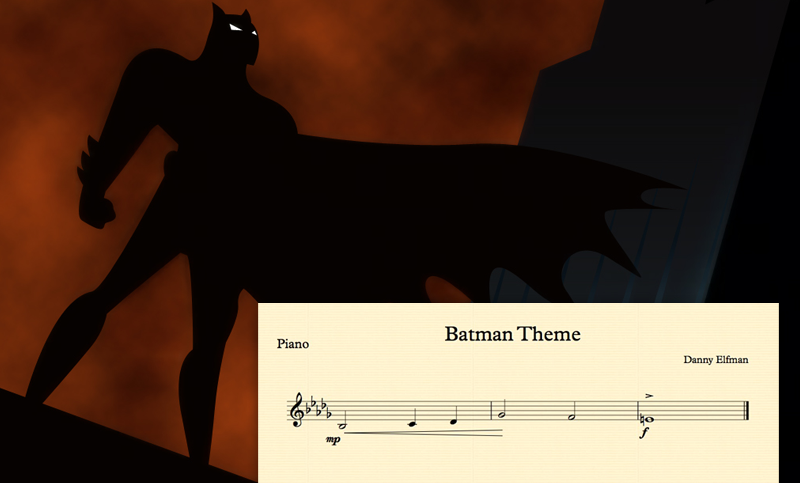
Batman: Main Theme
Story It Tells: The Dark Hero Watches His City, Then Swoops Into Action
Composer: Danny Elfman
Key: Bb Minor
Listen: Here
Batman has had a lot of different musical themes over the years. Danny Elfman’s is the best. That’s not just because it’s a really cool melody (it is), it’s because through the construction and development of the melody, it perfectly captures the essence of the Dark Knight.
The opening five-note motif perfectly projects an image of the caped crusader standing alone. The melody is low and menacing, all flatted thirds and sixths, dark and brooding and decidedly minor. The Bat stands on a rooftop like a gargoyle, surveying his city.
And then… action! The tempo shifts and the music becomes strident and chaotic, and the theme reasserts itself with far greater bombast. This is Batman in action. He has seen a crime from his perch and has swooped in to make wrongdoers pay. This piece of music is a Batman play in two acts. It evokes “Batman” not just because we associate it with the film it accompanied, but because it perfectly, musically evokes the character with its starring musical motif.
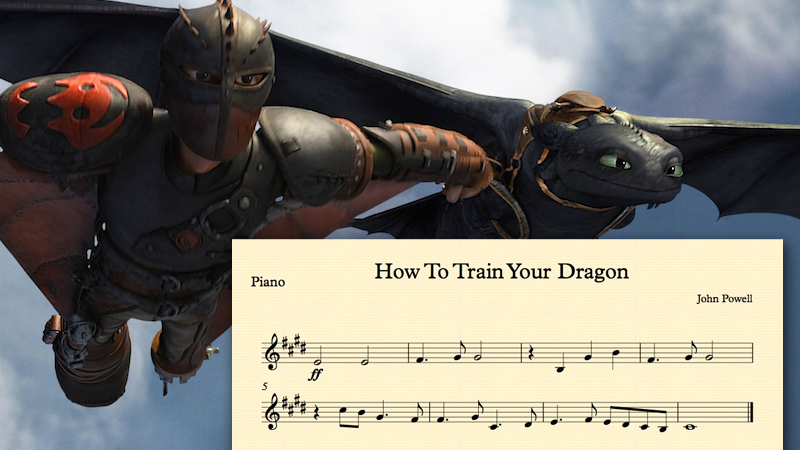
How To Train Your Dragon: Hiccup and Toothless’ Theme
Story It Tells: You Can Fly, and It Is So Awesome
Composer: John Powell
Key: E Major
Listen: Here
Look, not every entry on this list has to be from something that’s been on every “Best Soundtrack” list from the last 20 years. I really like what John Powell’s score for How To Train Your Dragon accomplishes and think it pushes a good movie toward greatness. The main heroic theme plays whenever Hiccup and his trusty night fury Toothless soar through the clouds, with the fully realized theme coming in at 2:00.
It’s a strong melody on its own, but it’s the phrasing that makes it soar. (Sorry.) The theme pushes forth with a muscular first phrase, then the subsequent phrases originate on the second beat of the bar. That’s what gives it such a feeling of bounding forward and upward. Think of those downbeats as the earth; Powell establishes a foundation, then lets his melody take to the sky.
This theme is also used to great effect in the sequel, folded into an original song from Jónsi. The instrumental “chorus” of the tune is actually a triumphant reprisal of the main theme from the film; it enters at 0:48 in the clip above, then again at 1:41. That’s not an unusual trick on its own—James Horner does something similar with the tie-in pop tunes from Titanic and Avatar—but thanks to some beautiful orchestration and clever sound mixing, it works really well.
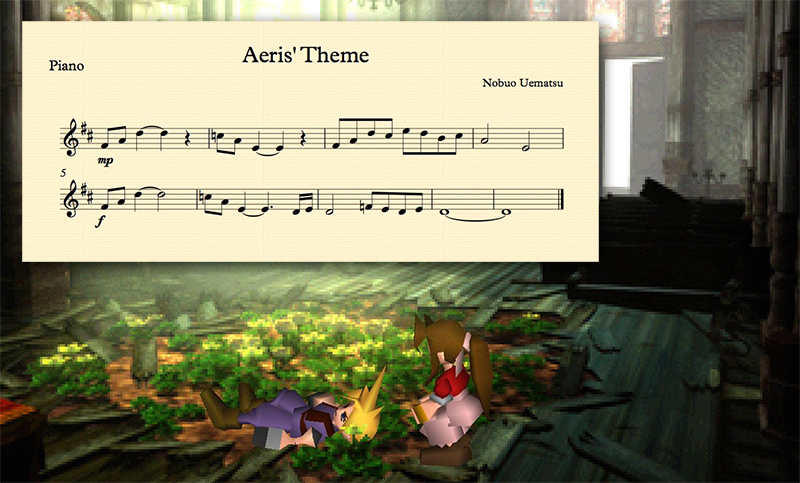
Final Fantasy VII: Aeris’ Theme
Story It Tells: Grace Appears in the Darkness
Composer: Nobuo Uematsu
Key: D Major
Listen: Here
I could’ve chosen a lot of different Final Fantasy themes for this, but I’m gonna go with Aeris’ theme from Final Fantasy VII. (I could have called it “Aerith’s Theme.” I went with Aeris. Let’s not make it a thing.) This theme is one of the most iconic of Nobuo Uematsu’s compositions for the classic JRPG series. It perfectly captures the essence of Aeris and musically tells the story of her first meeting with Cloud.
Those first three notes ring out of the silence, with a great deal of space between them: You see something but aren’t sure what it is, and as you get closer and closer… you see her, and her theme begins to play.
Of course, that same musical theme is reprised during the scene that broke a million hearts back in 1997, and that sequence is all the more effective for it. Interestingly, Final Fantasy VII’s protagonist Cloud doesn’t exactly have his own theme. I’ve always considered the piece of music titled “Cloud’s Theme” to be more of the main theme for Final Fantasy VII. But between Aeris’ theme and several others (Cid’s theme comes to mind), FFVII has more than enough heroic melodies to go around.
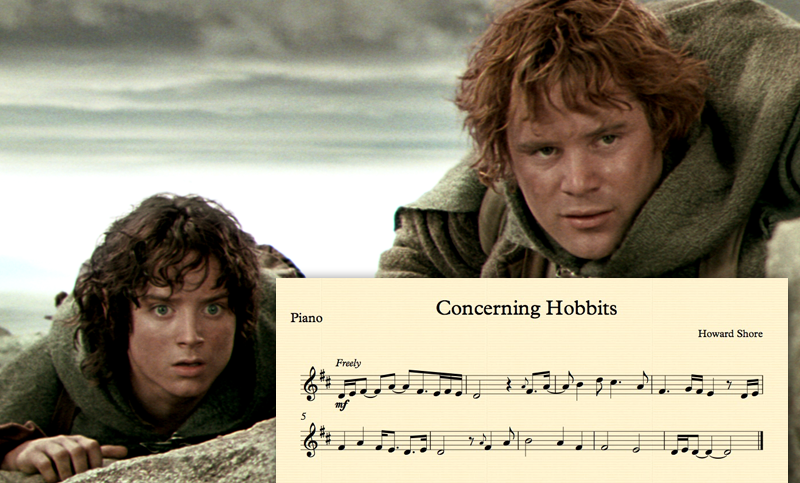
The Lord of the Rings: Concerning Hobbits
Story It Tells: Small, Simple Heroes Stand Alone
Composer: Howard Shore
Key: D Major
Listen: Here
The heroes of Tolkien’s The Lord of the Rings stand in purposeful contrast to most great fantasy heroes. Sam and Frodo aren’t great warriors or powerful wizards. They’re ordinary folk who like farming and living in peace.
The Hobbits’ essential goodness is the very thing that makes them able to save the world. They’re resistant to the power of the One Ring and thus able to carry it into Mordor and save Middle-Earth. Yet the characters who fit those more common hero archetypes—Aragorn and Legolas and Gandalf and the rest—fight only to serve Sam and Frodo on their more essential mission.
Howard Shore composed several iconic themes for Peter Jackson’s film trilogy, but the truest “heroic theme” is the simple theme of the Shire. It’s carefully woven throughout the score—and the trilogy—and often appears in unlikely places, usually performed on a variety of wind instruments by legendary flutist Sir James Galway.
When times are at their worst and all hope seems lost, that thin, fragile melody will float up above the deep brass and grumbling strings. It stands apart from the turmoil like, well, like two Hobbits standing on the edge of a land of darkness and fire. The Hobbits’ theme reminds us that however impossible the odds may seem, our heroes’ true hearts and unbreakable friendships will see them through.
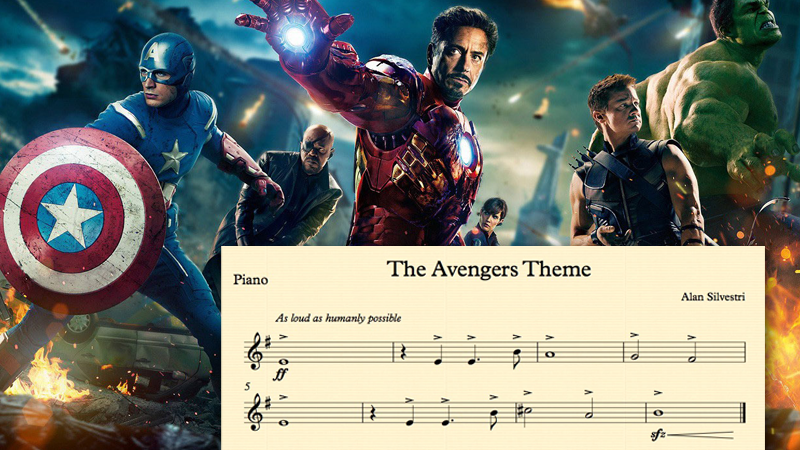
The Avengers: Main Theme
Story It Tells: A Team Of Mighty Heroes Finally Assembles
Composer: Alan Silvestri
Key: E Minor
Listen: Here
Alan Silvestri’s Avengers theme is a good one to end on. It’s the odd piece out on this list because it doesn’t actually have a very strong melody. That’s the point, though: It’s not the anthem of a single hero. The Avengers are a team of heroes, and the primary question driving the plot of Joss Whedon’s 2012 film was: Will the Avengers actually assemble? Can all these wildly different characters with wildly different motivations, backstories, and powers actually unite to save the world? And on a meta level, can the Marvel Cinematic Universe actually support a this kind of ambitious crossover event?
The answer to all of those questions was “fuck yes,” and Silvestri’s Avengers theme served as a proving ground and exultation. Listen to what’s going on in this rendition, which plays during the credits. It’s basically a two-minute-long musical interpretation of the Avengers assembling.
It starts with a driving low-string part that sounds like it could’ve been in a spy movie. The build-up goes through four distinct phases, building, building, and building again. Sylvestri feints at the main theme at 1:05, but it’s just more build-up. Finally at 1:25 the Avengers theme finally arrives. And when that happens…
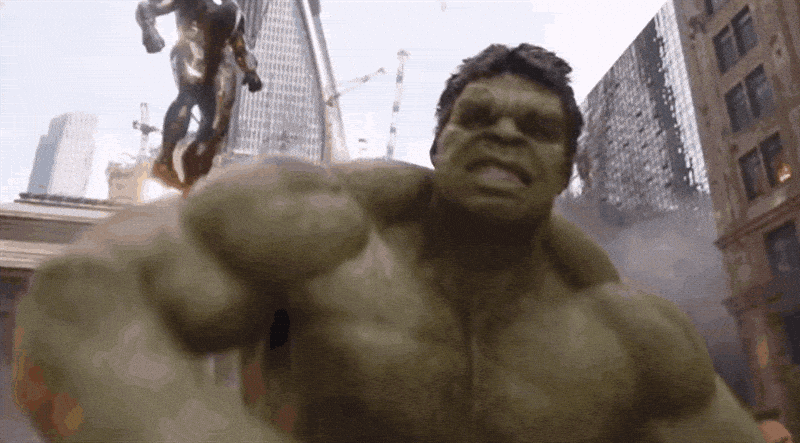
Bam. There’s the Avengers theme. It’s musically very simple, but when it finally arrives, it crashes down like the Hulk himself. It’s no coincidence that the scene in the gif above is accompanied by the purest, most emphatic rendition of that musical theme. It’s the climactic moment of the film, and the endpoint toward which the entire Marvel Cinematic Universe had been heading up to this point. The Avengers have assembled. This is it. The good guys are here, and they’re gonna win.
I’ve left more than a few worthy entries off of this list (Rocky, Pacific Rim, Superman, Metroid, and Chariots of Fire all come to mind), so I hope you’ll share some of your own favorite heroic themes in the comments below.
To contact the author of this post, write to kirk@kotaku.com.
Top illustration by Sam Woolley